| [](https://hub.ufzg.hr/uploads/images/gallery/2024-09/logo-stoo2-1-no.png) | **Odgoj danas za sutra:** **Premošćivanje jaza između učionice i realnosti** 3\. međunarodna znanstvena i umjetnička konferencija Učiteljskoga fakulteta Sveučilišta u Zagrebu Suvremene teme u odgoju i obrazovanju – STOO4 u suradnji s Hrvatskom akademijom znanosti i umjetnosti |
| ##### **Danijel Jukopila** *Učiteljski fakultet Sveučilišta u Zagrebu, Hrvatska* *danijel.jukopila@ufzg.hr* | |
| **Sekcija - Odgoj i obrazovanje za održivi razvoj** | **Broj rada: 31** | **Kategorija članka: Izvorni znanstveni rad** |
| ##### **Sažetak** |
| Koncept održivosti jedan je od četiriju koncepata u geografskome kurikulumu uz prostorne organizacije i procese, prostorni identitet i prostorni obuhvat. Sam koncept održivosti prisutan je u opisu predmeta, vrijednostima i načelima učenja i poučavanja geografije te u odgojno-obrazovnim ciljevima učenja i poučavanja geografije. Analizom kurikuluma nastavnog predmeta Geografija za osnovnu školu i gimnazije u Republici Hrvatskoj od ukupno 97 ishoda izdvojeno je njih 28 vezanih uz koncept održivosti bilo da su ti ishodi isključivo vezani uz ovaj koncept (12), bilo da su djelomično zastupljeni uz neki od preostalih koncepata (16) s obzirom na čestu isprepletenost koncepata u prostoru. Kvantitativnom analizom temeljenom na anketnom upitniku istražena je učenička percepcija koncepta održivosti u nastavi geografije. Rezultati su pokazali da učenici koncept održivosti najviše prepoznaju u području gospodarstva i okoliša, a manje u društvenom području. Najviše ga povezuju sa sadržajima biogeografije, ekonomske geografije, demogeografije te urbane geografije, a najmanje ga prepoznaju pri poučavanju o pojedinim gospodarskim granama u Hrvatskoj, posebice turizmu i poljoprivredi. Smatraju da će im učenje o održivosti pomoći u razumijevanju promjena koje će se događati u budućnosti te u definiranju vlastitog odnosa prema prirodi. Mišljenja su da održivim upravljanjem prirodnim resursima i održivim razvojem gospodarstva Hrvatska može poboljšati životni standard svojega stanovništva te očuvati najvrjednije prirodne lokalitete za buduće generacije. |
| ***Ključne riječi:*** |
| geografski koncepti; kurikulum; područje gospodarstva i okoliša |
| [](https://hub.ufzg.hr/uploads/images/gallery/2024-09/logo-stoo2-1-no.png) | **Teaching (Today for) Tomorrow:** **Bridging the Gap between the Classroom and Reality** 3rd International Scientific and Art Conference Faculty of Teacher Education, University of Zagreb in cooperation with the Croatian Academy of Sciences and Arts |
| **Student perception of the concept of sustainability in geography lessons** |
| ##### **Abstract** |
| The concept of sustainability is one of the four concepts in the geography curriculum along with spatial organizations and processes, spatial identity and spatial coverage. The very concept of sustainability is present in the subject description, values and principles of learning and teaching geography and in the educational goals of learning and teaching geography. Through the analysis of the curriculum of the Geography subject for primary and secondary schools in the Republic of Croatia, out of a total of 97 outcomes, 28 of them related to the concept of sustainability were singled out, whether these outcomes were exclusively related to this concept (12), or they were partially represented along with some of the remaining concepts (16) considering the frequent interweaving of concepts in space. The students' perception of the concept of sustainability in geography lessons was investigated using a quantitative analysis based on a questionnaire. The results showed that students recognize the concept of sustainability most in the field of economy and environment, and less in the social field. They mostly associate it with the contents of biogeography, economic geography, demogeography and urban geography, and they recognize it the least when teaching about certain economic branches in Croatia, especially tourism and agriculture. They think that learning about sustainability will help them understand the changes that will happen in the future and define their own relationship with nature. They are of the opinion that through sustainable management of natural resources and sustainable economic development, Croatia can improve the living standards of its population and preserve the most valuable natural sites for future generations. |
| ***Key words:*** |
| curriculum; geographical concepts; the field of economy and environment |
| [](https://hub.ufzg.hr/uploads/images/gallery/2024-09/logo-stoo2-1-no.png) | **Odgoj danas za sutra:** **Premošćivanje jaza između učionice i realnosti** 3\. međunarodna znanstvena i umjetnička konferencija Učiteljskoga fakulteta Sveučilišta u Zagrebu Suvremene teme u odgoju i obrazovanju – STOO4 u suradnji s Hrvatskom akademijom znanosti i umjetnosti |
| ##### **Alena Letina, Sanja Canjek-Androić** *Učiteljski fakultet Sveučilišta u Zagrebu, Hrvatska* *alena.letina@ufzg.hr* | |
| **Sekcija - Odgoj i obrazovanje za održivi razvoj** | **Broj rada: 32** | **Kategorija članka: Izvorni znanstveni rad** |
| ##### **Sažetak** |
| Odgoj i obrazovanje za održivi razvoj podrazumijeva multidisciplinarni pristup usmjeren na razvoj kompetencija potrebnih za kritičko promišljanje, odgovorno djelovanje i donošenje informiranih odluka u kontekstu održivog razvoja. Unatoč normativnim smjernicama i strateškim dokumentima koji ga promiču, još uvijek postoje izazovi u osposobljavanju budućih učitelja za njegovu učinkovitu provedbu. U ovome radu predstavljeni su rezultati istraživanja čiji je cilj ispitati pripremljenost studenata učiteljskih studija za provedbu odgoja i obrazovanja za održivi razvoj primjenom njegovih osnovnih načela u aktivnostima poučavanja i učenja. Istraživanje je provedeno na uzorku 170 studenata učiteljskih studija s Učiteljskog fakulteta Sveučilišta u Zagrebu. Podaci o percepciji studenata o spremnosti za kreiranje, provedbu, vrednovanje i sudjelovanje u aktivnostima poučavanja i učenja koje podržavaju održivi razvoj prikupljeni su anketnim upitnikom. Rezultati ukazuju na to da se stručno znanje i praksa, stručno sudjelovanje i samoregulacija mogu smatrati ključnim dimenzijama pripremljenosti studenata za provedbu odgoja i obrazovanja za održivi razvoj, pri čemu svaka od njih obuhvaća skup od nekoliko komponenata. Nadalje, utvrđena je pozitivna korelacija između stručnog znanja, vizije poučavanja i stručnog sudjelovanja. Istraživanje je također identificiralo određene slabosti u području obrazovanja budućih učitelja za provedbu odgoja i obrazovanja za održivi razvoj koje zahtijevaju detaljniju analizu i poboljšanje. U tom kontekstu, dana su preporuke za obogaćivanje učiteljskih programa ishodima učenja kako bi budućim učiteljima omogućili razvoj odgovarajućih kompetencija za provedbu odgoja i obrazovanja za održivi razvoj. |
| ***Ključne riječi:*** |
| dimenzije pripremljenosti; inicijalno obrazovanje učitelja; osposobljavanje budućih učitelja; održivi razvoj |
| M | C | D | SD | Skew | Kurt | Min | Maks | KS | |
| Projektna nastava | 3.8 | 4.0 | 4.0 | 0.86 | -0.29 | -0.57 | 2 | 5 | 3.18 |
| Istraživačka nastava | 3.9 | 4.0 | 4.0 | 0.90 | -0.53 | -0.46 | 2 | 5 | 3.28 |
| Problemska nastava | 4.0 | 4.0 | 4.0 | 0.81 | -0.36 | -0.53 | 2 | 5 | 3.14 |
| Izvanučionička nastava | 4.2 | 4.0 | 4.0 | 0.82 | -0.98 | 0.66 | 2 | 5 | 3.34 |
| Učenje otkrivanjem | 4.3 | 4.0 | 4.0 | 0.66 | -0.40 | -0.74 | 3 | 5 | 3.48 |
| Suradničko učenje | 4.3 | 4.0 | 5.0 | 0.73 | -0.82 | -0.02 | 2 | 5 | 3.90 |
| Uključivanje u akcije lokalne zajednice | 3.7 | 4.0 | 3.0 | 0.98 | -0.27 | -0.59 | 1 | 5 | 2.54 |
| Heuristička nastava | 4.4 | 5.0 | 5.0 | 0.81 | -1.13 | 0.52 | 2 | 5 | 4.34 |
| Istraživačka nastava | Problemska nastava | Izvanučionička nastava | Učenje otkrivanjem | Suradničko učenje | Uključi-vanje u akcije lokalne zajednice | Heuristička nastava | |
| Projektna nastava | \* | \*\* | \*\* | \*\* | \*\* | ||
| Istraživačka nastava | \*\* | \*\* | \*\* | \*\* | \*\* | ||
| Problemska nastava | \*\* | \*\* | \*\* | \*\* | \*\* | ||
| Izvanučionička nastava | \* | \*\* | \* | ||||
| Učenje otkrivanjem | \*\* | ||||||
| Suradničko učenje | \*\* | ||||||
| Uključivanje u akcije lokalne zajednice | \*\* |
| varijabla | b | β | t | p |
| Stručno znanje | -0.07 | -0.09 | -0.96 | 0.34 |
| Stručna praksa | 0.32 | 0.39 | 3.15 | 0.00 |
| Profesionalni angažman | 0.00 | 0.00 | 0.03 | 0.98 |
| Samoregulacija | -0.12 | -0.17 | -1.24 | 0.22 |
| Vizija poučavanja | -0.00 | -0.01 | -0.05 | 0.96 |
| Stručno znanje | Stručna praksa | Profesionalni angažman | Samoregulacija | Vizija poučavanja | |
| Stručno znanje | 1 | .59\*\* | .38\*\* | .44\*\* | .41\*\* |
| Stručna praksa | 1 | .64\*\* | .71\*\* | .60\*\* | |
| Profesionalni angažman | 1 | .78\*\* | .57\*\* | ||
| Samoregulacija | 1 | .59\*\* | |||
| Vizija poučavanja | 1 |
| Četvrta godina studija | Peta godina studija | t-test | |||
| M | SD | M | SD | ||
| Stručno znanje | 3.44 | 0.61 | 3.78 | 0.50 | -3.94\*\* |
| Stručna praksa | 3.76 | 0.55 | 4.00 | 0.49 | -2.93\*\* |
| Profesionalni angažman | 4.09 | 0.59 | 4.11 | 0.53 | -0.21 |
| Samoregulacija | 4.04 | 0.62 | 4.10 | 0.59 | -0.54 |
| Vizija poučavanja | 4.09 | 0.55 | 4.07 | 0.55 | 0.19 |
| Prosječna ocjena | |
| Stručno znanje | .07 |
| Stručna praksa | .22\*\* |
| Profesionalni angažman | .09 |
| Samoregulacija | .07 |
| Vizija poučavanja | .10 |
| [](https://hub.ufzg.hr/uploads/images/gallery/2024-09/logo-stoo2-1-no.png) | **Teaching (Today for) Tomorrow:** **Bridging the Gap between the Classroom and Reality** 3rd International Scientific and Art Conference Faculty of Teacher Education, University of Zagreb in cooperation with the Croatian Academy of Sciences and Arts |
| **Student teachers' preparedness for implementation of education for sustainable development** |
| ##### **Abstract** |
| The paper presents the results of research aimed at examining the student teachers' preparedness for the implementation of education for sustainable development by applying its basic principles in teaching and learning activities. The research was conducted on a sample of Teacher Education students from the Faculty of Teacher Education, University of Zagreb. Data on students' perceptions regarding the readiness to create, implement, evaluate, and participate in teaching and learning activities that support sustainable development were collected via a questionnaire. The results indicate that professional knowledge and practice, professional participation and self-regulation may be considered key dimensions of students' preparedness for the implementation of education for sustainable development, each of which includes several components. Furthermore, a positive correlation was established between professional knowledge, the vision of teaching, and professional participation. The research likewise identifies certain weaknesses in the field of education of future teachers for the implementation of education for sustainable development, which suggest the necessity of more detailed analysis and improvement. In the present context, recommendations are given for enriching initial teacher education programs with specific learning outcomes in order to facilitate future teachers' development, most notably appropriate competencies that allow for the implementation of education for sustainable development. |
| ***Key words:*** |
| dimensions of preparedness; initial teacher education; students' competencies; sustainable development |
| [](https://hub.ufzg.hr/uploads/images/gallery/2024-09/logo-stoo2-1-no.png) | **Odgoj danas za sutra:** **Premošćivanje jaza između učionice i realnosti** 3\. međunarodna znanstvena i umjetnička konferencija Učiteljskoga fakulteta Sveučilišta u Zagrebu Suvremene teme u odgoju i obrazovanju – STOO4 u suradnji s Hrvatskom akademijom znanosti i umjetnosti |
| ##### **Antonija Vukašinović** *Filozofski fakultet u Osijeku Hrvatska* *antonija.vukasinovic@gmail.com* | |
| **Sekcija - Odgoj i obrazovanje za održivi razvoj** | **Broj rada: 33** | **Kategorija članka: Izvorni znanstveni rad** |
| ##### **Sažetak** |
| U današnjem suvremenom svijetu koncept globalizacije i razvoj globalnih kompetencija postaje prioritet u obrazovanju. Globalizacija donosi potrebu za bržim protokom informacija i boljom povezanosti ljudi na gospodarskom planu. Razvoj globalnih kompetencija rezultira brojnim obrazovnim dobrobitima kako za učenika tako i za cjelokupnu kulturu društva. Stoga je cilj ovog istraživanja utvrditi kako studenti različitih studija u Republici Hrvatskoj shvaćaju važnost globalnih kompetencija i način implementacije znanja o globalnim kompetencijama u mikro i makro okruženju. U fokus grupi je sudjelovalo sedam studenata različitih studija Republike Hrvatske. Budući da je fokus grupa podrazumijevala *online* komunikaciju, a interakcija sudionika se snimala, a potom transkribirao razgovor, sudionici istraživanja su na samom početku pristali dobrovoljno sudjelovati u istraživanju te su se upoznali sa svrhom istraživanja i opsežnom analizom podataka koji jamče njihovu anonimnost. Pitanja koja su nastojala potaknuti dublju raspravu o spomenutoj temi formulirana su prema PISA upitniku iz 2018.god. Upitnik sadrži tematske cjeline o razvoju globalnih kompetencija kao dodatnu, inovativnu domenu. Kvalitativnim pristupom koji uključuje tematsku analizu podataka fokus grupa, utvrđeno je da se studenti različitih studija u Republici Hrvatskoj nisu susreli s kolegijima koji naglašavaju razvoj globalnih kompetencija, iako shvaćaju potrebu i važnost razvijenih globalnih kompetencija. Rezultati istraživanja ukazuju na važnost inoviranja razvoja globalnih kompetencija u studijskim programima visokih učilišta u Republici Hrvatskoj kako bi se kontinuirano razvijala svijest o važnosti globalnih kompetencija na svim razinama inicijalnog obrazovanja. |
| ***Ključne riječi:*** |
| fokus grupa ; globalne kompetencije; kultura društva; PISA upitnik; stavovi studenata |
| Komunikacija | Održivi razvoj | Rješavanje sukoba na globalnoj razini |
| Asertivnost | Redukcija potrošnje | Ekonomski bojkot |
| Aktivno slušanje Razumijevanje | Povećanje cijena energenata Projekti | |
| Kompromis | Edukacije | |
| Uvažavanje perspektive sugovornika | Odgoj u ranom djetinjstvu Povećanje subvencija za korištenje obnovljivih izvora energije Fuzijske elektrane Nuklearna fuzija kao novi izvor energije |
| Internacionalni socijalni problemi | Ljudska prava | Multikulturlizam |
| Nedostatak interesa Neupućenost | Kažnjavanje za eksploataciju radne snage Uspostava jednakosti spolova/plaća Smanjenje automatizacije Vrednovanje stručnosti prema kompetencijama Odgoj o jednakosti spolova Sankcije medijima zbog negativnog utjecaja dezinformacijama | Uvažavanje različitosti i kulture drugih Isticanje ljudskih vrijednosti Odbacivanje stereotipa od najranije dobi *Online* okruženje za prevođenje stranog jezika |
| [](https://hub.ufzg.hr/uploads/images/gallery/2024-09/logo-stoo2-1-no.png) | **Teaching (Today for) Tomorrow:** **Bridging the Gap between the Classroom and Reality** 3rd International Scientific and Art Conference Faculty of Teacher Education, University of Zagreb in cooperation with the Croatian Academy of Sciences and Arts |
| **The importance of developing global competencies from the perspective of students in the Republic of Croatia** |
| ##### **Abstract** |
| In today's modern world, the concept of globalization and the development of global competences becomes a priority in education. Modernity brings the need for a faster flow of information and a better connection of people in the economic field. The development of global competencies results in numerous educational benefits both for the student and for the entire culture of society. Therefore, the goal of this research is to determine how students of various studies in the Republic of Croatia understand the importance of global competencies and the way to implement knowledge about global competencies in the micro and macro environment. In the focus group, 7 students from different studies throughout the Republic of Croatia participated. Since the focus group involved online communication, and the interaction of the participants was recorded and the conversation was then transcribed, the research participants agreed to voluntarily participate in the research at the very beginning and were familiarized with the purpose of the research and the comprehensive analysis of data that guarantees their anonymity. The questions, which tried to stimulate an in-depth discussion on the mentioned topic, were formulated according to the PISA questionnaire (2018), which contains thematic units on the development of global competences as an additional, innovative domain. Through a qualitative approach that includes the thematic analysis of focus group data, it was determined that students of various studies in the Republic of Croatia did not encounter courses that emphasize the development of global competencies, even though they understand the importance of developing them. The research results point to the importance of innovating the development of global competencies in the study programs of higher education institutions in the Republic of Croatia to continuously develop awareness of the importance of global competencies in all levels of initial education. |
| ***Key words:*** |
| culture of society; focus group ; global competencies; PISA questionnaire; student attitudes |
| [](https://hub.ufzg.hr/uploads/images/gallery/2024-09/logo-stoo2-1-no.png) | **Teaching (Today for) Tomorrow:** **Bridging the Gap between the Classroom and Reality** 3rd International Scientific and Art Conference Faculty of Teacher Education, University of Zagreb in cooperation with the Croatian Academy of Sciences and Arts |
| ##### **Imelda Zadeja, Jozef Bushati** *University of Shkodra "Luigj Gurakuqi", Albania* *imelda.zadeja@gmail.com* | |
| **Section - Education for sustainable development** | **Paper number: 34** | **Category: Scientific review** |
| ##### **Abstract** |
| Artificial Intelligence is rapidly transforming the landscape of education, presenting both challenges and unprecedented opportunities for sustainable development. This study investigates the multifaceted impact of AI on educational practices, focusing on administration, instruction, and learning process. A qualitative research approach was employed, utilizing a literature review framework to explore AI's application and effects in education. AI embodies a range of innovations characterized by human-like cognitive abilities, learning processes, adaptability, and decision-making capabilities. As AI integrates into educational systems, it blurs the lines between traditional roles and tasks, leading to a reshaping of professions and instructional methods. Some professions may become obsolete, while others undergo substantial transformations requiring updated didactic materials. Concurrently, new vocations will emerge necessitating innovative educational approaches. In educational operations, AI serves as both a reformer and facilitator, reshaping job roles and work dynamics. This study underscores the need for educators and policymakers to proactively address the implications of AI, ensuring equitable access to technological advancements and harnessing AI's potential to enhance educational outcomes. By embracing AI responsibly, the education sector can leverage emerging technologies for sustainable development and improved learning experiences. This research contributes to the ongoing discourse on AI in education, highlighting critical challenges and transformative opportunities for the future. |
| ***Key words:*** |
| artificial intelligence; responsible AI; transformative education; emerging technologies; educational outcomes. |
| [](https://hub.ufzg.hr/uploads/images/gallery/2024-09/logo-stoo2-1-no.png) | **Teaching (Today for) Tomorrow:** **Bridging the Gap between the Classroom and Reality** 3rd International Scientific and Art Conference Faculty of Teacher Education, University of Zagreb in cooperation with the Croatian Academy of Sciences and Arts |
| ##### **Tamara Zaninović1, Ana Sopina2, Bojana Bojanić Obad Šćitaroci3, Vesna Gulin Beljak4, Mirela Sertić Perić5** *University of Zagreb Faculty of Architecture1,2,3, Croatia* *University of Zagreb, Faculty of Science4,5, Croatia* *tmaric@arhitekt.unizg.hr* | |
| **Section - Education for sustainable development** | **Paper number: 35** | **Category: Preliminary communication** |
| ##### **Abstract** |
| Urban ecology explores how living organisms, including humans, interact with each other and their environment in urban settings. It is an interdisciplinary field that connects biology, urban planning and other disciplines. This paper presents how urban ecology topics are integrated into educative framework of University of Zagreb through the methodology and results of collaboration between students and teachers of two faculties (Faculty of Science, Department of Biology, and Faculty of Architecture, Department of Urban Planning, Spatial Planning, and Landscape Architecture) of the University of Zagreb. This collaboration demonstrates the successful application of a multidisciplinary approach in teaching and learning, evolving into an inter- and transdisciplinary approach, underlining its importance in addressing the pressing challenges of sustainable urban development. The collaboration began in the 2020/2021 academic year with the introduction of the *Urban Ecology* elective as part of the Master’s degree programme in Environmental Sciences at the Faculty of Science, and linking its content with the *Design Studio III – Landscape Architecture* course, an integral compulsory component of the Bachelor's degree programme in Architecture. Over the course of four academic years (2020 - 2024), the teaching methodology evolved through the integration of multidisciplinary lectures and participatory efforts that involve local communities in the students' project development process. Students' projects focus on different sites within a common urban context, such as the New Zagreb neighbourhoods - an outstanding example of modernist and post-modernist urban planning in Zagreb, Croatia. The results of the student projects show the importance of integrating urban/landscape design and ecological solutions. The projects have demonstrated how such integration can improve urban liveability and sustainability. The success of this collaborative framework is in line with the Sustainable Development Goals and highlights the value of a multi-, inter- and transdisciplinary approach to planning sustainable urban solutions. |
| ***Key words:*** |
| interdisciplinary; exhibitions; project-based learning; public space; Zagreb |
| Structure and organisation of semester | **Lectures** **UE + DS** | **Seminar ** **UE (FoS)** | **Workshops** **DS (FoA)** | **Exhibitions ** **UE + DS** |
| SEMESTER PREPARATION BLOCK **September** | \_**meetings** with teachers and local community | / | / | / |
| 1. BLOCK - CONTEXT Introduction to the assignment **October** | \_**introduction lectures** – assignment presentation, urban development \_**field lectures** – teachers and local community | \_** selecting location ** \_definition of **research topic** \_interpretation of **good practices** | \_**selecting location** \_research of **location context** \_**theoretical background** \_interpretation of **project examples** | / |
| 2. BLOCK – CONCEPT Application of research topics **November** | \_**conceptual lectures** – landscape ideas, ecological and social aspects | \_**application **of research topic within the selected location \_**project programme** | \_**concept and programme** of wider urban landscape system | \_exhibition of **student projects posters from previous **academic year |
| 3. BLOCK – DESIGN SOLUTIONS **December and January** | \_**design lectures** – urban design, product design, materials and construction | \_preparation of **project seminar** \_**poster** finalisation | \_**conceptual landscape solution** of public space \_**poster** finalisation | \_**final presentations** with critics \_final presentation of **project posters** |
| POST-SEMESTER BLOCK | \_**round table** on results of the New Zagreb series | / | / | \_**public exhibitions** in places of local communities and fairs |
| **Series assignment** | ** ** | **New Zagreb East** ** ** | **New Zagreb South** ** ** | **New Zagreb West** ** ** |
| **Local communities / neighbourhood** | Zapruđe, Utrina, Travno and Dugave | Utrina, Sopot, Siget and Trnsko | Kajzerica, Savski gaj, Lanište and Trnsko | |
| **Academic year** | 2021/2022 | 2022/2023 | 2023/2024 | |
| **Assignment aim** | Revitalisation of neighbourhoods & transformation of public spaces | Revitalisation & reaffirmation of crucial public spaces | (Re)connecting & transforming public spaces into places | |
| **Assignment moto** | Heritage Revitalisation | Community Spaces | Slash city | |
| **Assignment sites** | 4 neighbourhoods\* | 6 locations | 7 locations | |
| **Number of students** | FoS = 5 FoA = 100 | FoS = 1 FoA = 132 FoAgr = 21 | FoS = 12 FoA = 101 | |
| **Number of project proposals at the Faculty of Science (FoS) \_ Urban *Ecology course*** | 5 seminars 1 common presentation | 1 poster 1 seminar | 6 posters 7 seminars | |
| **Number of project proposals at the Faculty of Architecture (FoA) \_ *Design Studio III - Landscape Architecture*** | 43 posters and booklets | 56 posters and booklets | 54 posters and booklets | |
| **Number of project proposals at the Faculty of Agronomy (FoAgr) \_ *Urban Landscape Design* and *Studio 1 – Landscape Design*** | / | 25 posters | / | |
| ** ** **Cohabitation between people and the natural world** ** ** 1 2 3 4 5 |
| 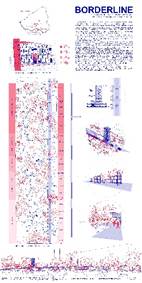 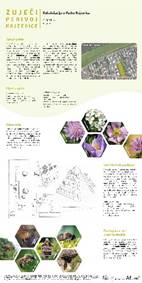 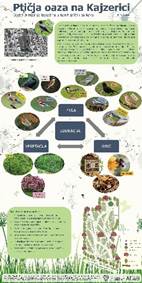 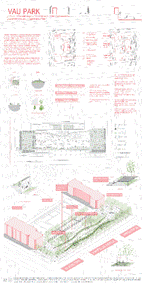 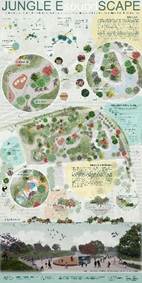 |
| 1 project **Borderline**; authors: students Ema Kundić, Marta Lulić; ,2021/2022, New Zagreb East 2 project **Buzzing Park of Kajerica**; authors: students Katja Bukivć, Ana Erić; FoS, 2023/2024, New Zagreb West 3 project **Bird Oasis** in Kajzerica; author: student Maša Gošev; , 2023/2024, New Zagreb West 4 project **Vau Park**; authors: students Lana Majhut, Paula Mazerekić; , 2022/2023, New Zagreb South 5 project **Jungle EsoundScape**; authors: students Rahela Benčić, Paula Budija; , 2023/2024, New Zagreb West |
| ** ** **Renaturalisation, natural based solutions, water sensitive approach** ** ** 1 2 3 4 5 |
| 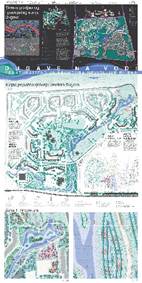 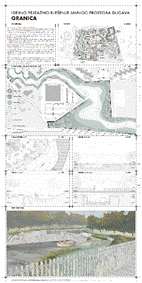 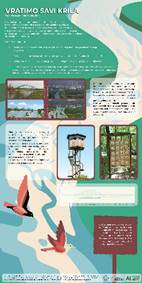 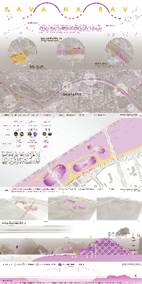 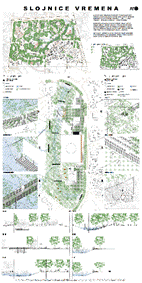 |
| 1 project **Dugave on water** – Renaturalisation of the invisible river; authors: students Magdalena Tusun, Antonia Vrdoljak; ., 2021/2022, New Zagreb East 2 project **Border**; authors: students Karla Klobučar, Jurica Koren; , 2021/2022, New Zagreb East 3 project **Restoring Wings to (River) Sava**; authors: students Dora Dubravac, Marija Meklav; , 2023/2024, New Zagreb West 4 project **Sava on Sava**; authors: students Mila Erceg, Ana Grgić; , 2023/2024, New Zagreb West 5 project **Time Layers**; authors: students Luka Šarić, David Štrbac; , 2021/2022, New Zagreb East |
| ** ** **Food production - urban gardens and food distribution - urban markets** ** ** 1 2 3 4 5 |
| 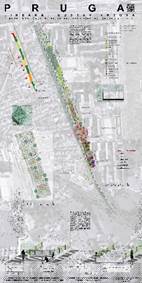 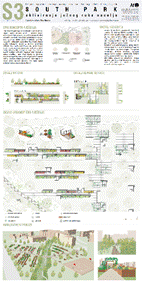 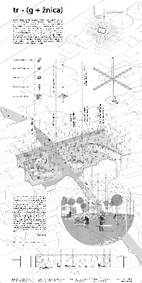 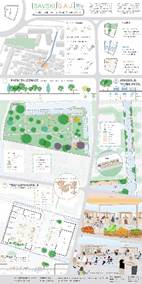 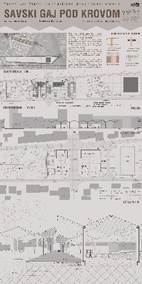 |
| 1 project **Rail -** **Linear Garden System**; authors: students Tonka Ileković, Ana Imrović; , 2023/2024, New Zagreb West 2 project **South Park**; authors: students Karla Sabo, Petra Stepušin; , 2022/2023, New Zagreb South 3 project **tr** • **(g+žnica)**; authors: students Mario Miličić, Ana Maria Milić; FoA, 2023/2024, New Zagreb West 4 project **Savski G.A.J.**; authors: students Petra Bakotić, Emma Čović; , 2023/2024, New Zagreb West 5 project **Savski Gaj under Roof**; author: student Ria Ivandić; , 2023/2024, New Zagreb West |
| ** ** **Educative parks and centres** ** ** 1 2 3 4 5 |
| 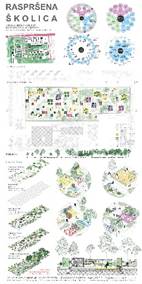 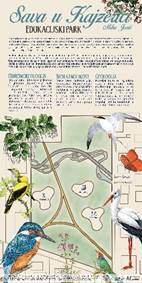 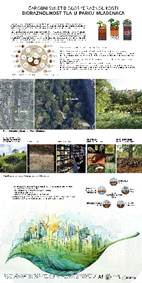 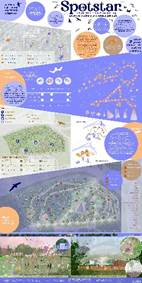 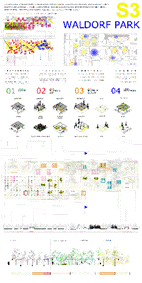 |
| 1 project **Dispersed** **School**; author: student Damjan Borovina; , 2022/2023, New Zagreb South 2 project **Sava in Kajzerica – Educational park**; author: student Miha Jurić; , 2023/2024, New Zagreb West 3 project **The Magical World of Soil Biodiversity**; author: student Marija Dadić; 2022/2023, New Zagreb South 4 project **Spotstar**; authors: students Iris Antunović, Lana Bedrina; , 2023/2024, New Zagreb West 5 project **Waldorf Park**; author: student Ana Berać; ., 2022/2023, New Zagreb South |
| ** ** **Contemplative places and healing gardens** ** ** 1 2 3 4 5 |
| 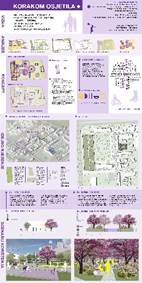 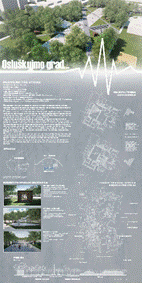 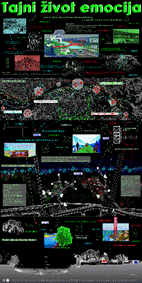 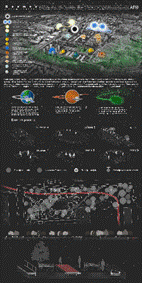 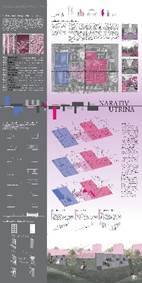 |
| 1 project **Step of the Senses**; authors: students Barbara Tomorad, Luka Žulić; FoA, 2021/2022, New Zagreb East 2 project **L****et's Listen the Park**; authors: students Dominik Feješ, Luka Dropuljić; FoA, 2021/2022, New Zagreb East 3 project **Secret Life of Emotions**; authors: students Antea Dujić, Iva Žaja; FoA, 2023/2024, New Zagreb West 4 project **Cosmos**; author: student Sandro Barić; FoA, 2022/2023, New Zagreb South 5 project **Utrine Narrative**; authors: students Kristina Milin, Petra Mihaljević; FoA, 2021/2022, New Zagreb East |
| * * |
| **Series assignment** | ** ** | **New Zagreb East** ** ** | **New Zagreb South** ** ** | **New Zagreb West** ** ** |
| **Local communities / neighbourhood** | Zapruđe, Utrina, Travno and Dugave | Utrina, Sopot, Siget and Trnsko | Kajzerica, Savski gaj, Lanište and Trnsko | |
| **Academic year** | 2021/2022 | 2022/2023 | 2023/2024 | |
| **Assignment aim** | Revitalisation of neighbourhoods & transformation of public spaces | Revitalisation & reaffirmation of crucial public spaces | (Re)connecting & transforming public spaces into places | |
| **Assignment moto** | Heritage Revitalisation | Community Spaces | Slash city | |
| **Exhibitions with lectures for students** | Zagreb Society of Architects (DAZ) 2.-11.11.2022. | Zagreb Society of Architects (DAZ) 6.-10.11.2023. | Zagreb Society of Architects (DAZ) 4.-8.11.2024. | |
| **Exhibitions organised by local communities** | / | April 2022 Museum of Contemporary Art (MSU) 27.5.2023. | Park Mladenaca, Q’ART 07.07.2024. | |
| **Conferences, workshops/webinars and symposia** | Exhibition of selected 10 student posters (5 from Faculty of Architecture and 5 from Faculty of Science) with video presentation about the series assignments in New Zagreb called *Urban Ecology – synergy of biology and urban planning* at Science Fair, Technical Museum, Zagreb 22.–27.04.2024. | |||
| Round table discussion where the idea and achieved multidisciplinary collaboration was explained with introduction to new series assignment (*Old New Zagreb – Ulica grada Vukovara*) at DAZ 8.11.2024. | ||||
| Lecture on the series assignments and student’s projects with discussion at *Nexus Implementation: Potential and Opportunities*, 05.–06.11.2024. (online conference) | ||||
| [](https://hub.ufzg.hr/uploads/images/gallery/2024-09/logo-stoo2-1-no.png) | **Odgoj danas za sutra:** **Premošćivanje jaza između učionice i realnosti** 3\. međunarodna znanstvena i umjetnička konferencija Učiteljskoga fakulteta Sveučilišta u Zagrebu Suvremene teme u odgoju i obrazovanju – STOO4 u suradnji s Hrvatskom akademijom znanosti i umjetnosti |
| **Urbana ekologija unutar multidisciplinarnog edukativnog okvira** **Urbana ekologija u okviru multidisciplinarne edukacije** |
| ##### **Sažetak** |
| Urbana ekologija istražuje kako živi organizmi, uključujući i ljude, međusobno utječu jedni na druge i na svoj okoliš u urbanim područjima. To je interdisciplinarno područje koje povezuje biologiju, urbanističko planiranje i druge discipline. Ovaj rad pokazuje kako su teme urbane ekologije integrirane u edukacijski okvir Sveučilišta u Zagrebu kroz pregled metodologije i rezultata suradnje studenata i nastavnika dvaju fakulteta (Prirodoslovno-matematički fakultet, Biološki odsjek i Arhitektonski fakultet, Katedra za urbanizam, prostorno planiranje i pejsažnu arhitekturu). Ova suradnja pokazuje uspješnu primjenu multidisciplinarnog pristupa u poučavanju i učenju, koji se postupno razvija u inter- i transdisciplinarni okvir, i naglašava važnost takve suradnje u rješavanju gorućih izazova održivog urbanog razvoja. Suradnja je započela u akademskoj godini 2020./2021. uvođenjem izbornog predmeta *Urbana ekologija* u sklopu diplomskog studija Znanosti o okolišu na Prirodoslovno-matematičkom fakultetu te njegovim sadržajnim povezivanjem s kolegijem *Studio 3 - Pejsažna arhitektura*, obaveznim kolegijem sveučilišnog prijediplomskog studija Arhitekture i urbanizma. Tijekom tri akademske godine (2020. - 2024.) metodologija nastave razvijala se kroz integraciju multidisciplinarnih predavanja i participativnih napora koji uključuju lokalne zajednice u proces razvoja studentskih projekata. Studentski projekti fokusiraju se na različite lokacije unutar zajedničkog urbanog konteksta, kao što su novozagrebačke četvrti, koje predstavljaju vrijedan primjer modernističkog i postmodernističkog urbanog planiranja u Zagrebu, Hrvatska. Rezultati studentskih projekata pokazuju važnost integracije urbanističkog projektiranja i ekoloških rješenja. Projekti su pokazali kako takva integracija može unaprijediti kvalitetu urbanog života i doprinijeti održivosti urbanih sredina. Uspjeh ovog okvira suradnje u skladu je s ciljevima održivog razvoja i naglašava vrijednost multi-, inter- i transdisciplinarnog pristupa u planiranju održivih urbanih rješenja. |
| ***Ključne riječi:*** |
| interdisciplinarnost; izložbe; javni prostor; projektno učenje; Zagreb |
| [](https://hub.ufzg.hr/uploads/images/gallery/2024-09/logo-stoo2-1-no.png) | **Odgoj danas za sutra:** **Premošćivanje jaza između učionice i realnosti** 3\. međunarodna znanstvena i umjetnička konferencija Učiteljskoga fakulteta Sveučilišta u Zagrebu Suvremene teme u odgoju i obrazovanju – STOO4 u suradnji s Hrvatskom akademijom znanosti i umjetnosti |
| ##### **Lejla Kafedžić, Snježana Šušnjara** *Filozofski fakultet, Univerzitet u Sarajevu, Bosna i Hercegovina* *broginic@gmail.com* | |
| **Sekcija - Odgoj i obrazovanje za održivi razvoj** | **Broj rada: 36** | **Kategorija članka: Pregledni rad** |
| ##### **Sažetak** |
| Ciljevi održivog razvoja predstavljaju transformativni plan za stvaranje bolje i održive budućnosti za cijeli svijet. Jedan od visokorangiranih ciljeva održivog razvoja je kvalitetno i inkluzivno obrazovanje sve djece** **što potvrđuje uvjerenje da je ono moćno i dokazano sredstvo održivog razvoja. Kako bi bili postignuti postavljeni (pod)ciljevi, važno je integrirati igru u proces podučavanja i učenja, naročito u razrednoj nastavi, jer je ona temeljna i iskonska aktivnost koja u potpunosti odgovara prirodi djeteta, te predstavlja važan put razvoja djeteta. Zahvaljujući igri dijete upoznaje svoju okolinu, uči o sebi, o drugima i o svijetu općenito, ali i razvija osjećaj sigurnosti, samokontrole, samostalnosti, razvija kompetencije, te jača samopouzdanje. Dijete u igri razvija kreativnost, suradnju i poduzetništvo. Cilj rada je prikazati na primjeru dječije igre mogućnosti ostvarivanja integrirane nastave čime se omogućava učenicima da uvide povezanost između različitih nastavnih predmeta i važnost interdisciplinarnosti kakav je i sam život i životne situacije. Korištene metode u istraživanju su: metoda analize sadržaja, historijska metoda i deskriptivna metoda. Rezultati istraživanja potvrđuju važnost igre u životu djeteta, te da djeca mogu biti kreatori igre koja u realizaciji uključuje sadržaje različitih nastavnih predmeta, ali i razvija različite ključne kompetencije koje su polazište za svakog pojedinca u društvu temeljenom na znanju. U ovom procesu uloga i kompetencije nastavnika su izuzetno važni, jer potiču razvoj djetetovih vještina i sposobnosti, potiču na suradnju s vršnjacima, uključuju u aktivnosti u odjeljenju, te omogućavaju adekvatan udio igre u nastavi. Igrom se dijete priprema za sadašnjost i budućnost tako da je ona neophodna za njegov daljnji razvoj. |
| ***Ključne riječi:*** |
| igra; kompetencije; nastavnik; podučavanje; učenje |
| Naziv ključne kompetencije | Definicija ključne kompetencije |
| Komunikacija na maternjem jeziku | Komunikacija na materinskom jeziku je sposobnost izražavanja pojmova, misli, osjećaja, činjenica i mišljenja u govorenom i u pisanom obliku (slušanje, govor, čitanje i pisanje) te odgovarajuće i kreativne jezične interakcije u cijelom nizu društvenih i kulturnih okruženja, u odgoju i obrazovanju, pri radu, u domu i u slobodnom vremenu. |
| Komunikacija na stranom jeziku | Komunikacija na stranom jeziku u širem smislu obuhvaća glavne dimenzije vještina kao i komunikacija na materinskom jeziku: zasniva se na sposobnosti razumijevanja, izražavanja i tumačenja pojmova, misli, osjećaja, činjenica i mišljenja u govorenom i u pisanom obliku (slušanje, govor, čitanje i pisanje) u odgovarajućem nizu društvenih i kulturnih okruženja (u odgoju i obrazovanju, pri radu, u domu i u slobodnom vremenu) prema vlastitim željama ili potrebama. |
| Matematička kompetencija | Matematička kompetencija je sposobnost razvijanja i primjene matematičkog mišljenja u cilju rješavanja niza problema u svakodnevnim situacijama. Ova kompetencija uključuje, u različitim stupnjevima, sposobnost i volju korištenja matematičkog načina mišljenja (logičko i prostorno razmišljanje) i izražavanja (formulama, modelima, konstrukcijama, grafikonima, dijagramima). |
| Digitalna kompetencija | Digitalna kompetencija obuhvaća sigurno i kritičko korištenje tehnologija informacijskog društva za rad, slobodno vrijeme i komunikaciju. Nju podupiru osnovne vještine IKT: korištenje računala za traženje, procjenjivanje, pohranjivanje, proizvodnju, prezentiranje i razmjenu informacija te za sudjelovanje i komuniciranje u kolaborativnim mrežama preko interneta. |
| Učenje učenja | Kompetencija učenja (učenje učenja) jest sposobnost započinjanja i nastavljanja učenja, organiziranja vlastitog učenja, podrazumijevajući i učinkovito upravljanje vremenom i informacijama, kako individualno tako i u grupama. Ova kompetencija uključuje spoznavanje vlastitih metoda učenja i vlastitih potreba, prepoznavanje raspoloživih mogućnosti i svladavanje prepreka da bi se uspješno učilo. |
| Društvene i građanske kompetencije | One uključuju osobne, međuljudske i interkulturalne kompetencije i obuhvaćaju sve oblike ponašanja koje pojedinac treba svladati da bi na učinkovit i konstruktivan način sudjelovao u društvenom i profesionalnom životu, posebno u sve heterogenijim društvima, kao i u rješavanju eventualnih sukoba. |
| Smisao za inicijativu i poduzetništvo | Smisao za inicijativu i poduzetništvo označava sposobnost pojedinca da pretvori ideje u djela. Ona obuhvaća kreativnost, inovaciju i preuzimanje rizika, kao i sposobnost planiranja i vođenja projekata radi ostvarivanja ciljeva. |
| Kulturalna senzibilizacija i izražavanje | Uvažavanje važnosti kreativnog izražavanja ideja, iskustava i osjećaja u raznim oblicima kao što su glazba, reproduktivne umjetnosti, književnost i vizualne umjetnosti. |
| Elementi igre | Ključne kompetencije | Nastavni predmet |
| Plakat napisan na BHS jeziku. *Profesionalna *komunikacija s *klijentima*. Časopisi i knjige u *čekaonici.* | Komunikacija na maternjem jeziku | Maternji jezik B/H/S jezik |
| Dio plakata napisan na engleskom jeziku. | Komunikacija na stranom jeziku | Engleski jezik |
| Cijene usluga. Smanjenje originalnih cijena usluga za 50%. | Matematička kompetencija | Matematika |
| Kreiranje plakata za promociju Centra. | Kulturalna senzibilizacija i izražavanje | Likovna kultura |
| Učenje kroz dječju igru. | Učiti kako učiti | Svi nastavni predmeti |
| *Profesionalna *komunikacija s *klijentima*. Nalaženje rješenja za *klijenta* koji je trebao raniji termin pregovaranjem s drugim *klijentom*. | Društvene i građanske kompetencije | Svi nastavni predmeti |
| Osmišljavanje ideje *Spa centra* u kućnim uvjetima. Promotivno smanjenje cijena usluga za 50% prvi dan rada Centra. | Smisao za inicijativu i poduzetništvo | Svi nastavni predmeti |
| [](https://hub.ufzg.hr/uploads/images/gallery/2024-09/logo-stoo2-1-no.png) | **Teaching (Today for) Tomorrow:** **Bridging the Gap between the Classroom and Reality** 3rd International Scientific and Art Conference Faculty of Teacher Education, University of Zagreb in cooperation with the Croatian Academy of Sciences and Arts |
| **The importance of a game in the teaching process** |
| ##### **Abstract** |
| The Sustainable Development Goals represent a transformative plan to create a better and more sustainable future for the entire world. One of the high-ranking goals of sustainable development is quality and inclusive education for all children, which confirms the belief that it is a powerful and proven means of sustainable development. In order to achieve the set (sub)goals, it is important to integrate play into the teaching and learning process, especially in the classroom, because it is a fundamental and primordial activity that fully corresponds to the child's nature, and represents an important path for the child's development. Thanks to the game, the child gets to know its environment, learns about itself, others and the world in general, but also develops a sense of security, self-control, independence, develops competencies, and strengthens self-confidence. The child develops creativity, cooperation and entrepreneurship in the game. The aim of the paper is to show, using the example of a children's game, the possibilities of integrated teaching, which enables students to see the connection between different teaching subjects and the importance of interdisciplinarity, which is life itself and life situations. The methods used in the research are: content analysis method, historical method and descriptive method. The results of the research confirm the importance of play in a child's life, and that children can be the creators of a game that includes the contents of various teaching subjects, but also develops different key competencies that are the starting point for every individual in a knowledge-based society. In this process, the role and competencies of the teacher are extremely important, because they encourage the development of the child's skills and abilities, encourage cooperation with peers, involve them in activities in the class, and enable an adequate share of play in the lesson. Through play, the child prepares for the present and the future, so that it is necessary for its further development. |
| ***Key words:*** |
| competences; game; learning; teacher; teaching* * |
| [](https://hub.ufzg.hr/uploads/images/gallery/2024-09/logo-stoo2-1-no.png) | **Odgoj danas za sutra:** **Premošćivanje jaza između učionice i realnosti** 3\. međunarodna znanstvena i umjetnička konferencija Učiteljskoga fakulteta Sveučilišta u Zagrebu Suvremene teme u odgoju i obrazovanju – STOO4 u suradnji s Hrvatskom akademijom znanosti i umjetnosti |
| ## **Đurđica Stanešić1, Višnja Pranjić2** *Škola za medicinske sestre Mlinarska, Croatia1* *Škola za medicinske sestre Vinogradska, Croatia2* *dstanesic1@gmail.com* | |
| **Sekcija - Odgoj i obrazovanje za održivi razvoj** | **Broj rada: 37** | **Kategorija članka: Stručni rad** |
| ##### **Sažetak** |
| Projekt „Modernizacija sustava strukovnog obrazovanja i osposobljavanja” realizirala je Agencija za strukovno obrazovanje i obrazovanje odraslih. Njegova svrha je razvoj strukovnog obrazovanja i osposobljavanja koje je privlačno, inovativno, relevantno i povezano s tržištem rada (ASOO). Projekt je sufinanciran sredstvima iz Europskog socijalnog fonda. Krajnji cilj projekta je razvoj novih strukovnih kurikula usklađenih s potrebama tržišta rada ali i modernim pedagoškim smjernicama. Iskorak u pedagoškoj praksi je planiranje strukovnih kurikula u modulima. Modul čini logičnu i smislenu cjelinu u kojoj su povezani skupovi ishoda učenja. U svakom sektoru razvija se i sektorski kurikul koji čini sektorsku jezgru: predmete zajedničke svim kurikulima unutar sektora te podsektorski dio zajednički srodnim zanimanjima. Rad opisuje razvoj standarda zanimanja, standarda kvalifikacija i strukovnih kurikula u sektoru Zdravstvo. |
| ***Ključne riječi:*** |
| standard zanimanja; standard kvalifikacije; strukovni kurikuli; strukovno obrazovanje |
| [](https://hub.ufzg.hr/uploads/images/gallery/2024-09/logo-stoo2-1-no.png) | **Teaching (Today for) Tomorrow:** **Bridging the Gap between the Classroom and Reality** 3rd International Scientific and Art Conference Faculty of Teacher Education, University of Zagreb in cooperation with the Croatian Academy of Sciences and Arts |
| **Development of vocational curricula as part of the ESF project *Modernisation of the Vocational Education and Training System* in the Health sector** |
| ##### **Abstract** |
| The project titled *Modernisation of the Vocational Education and Training System* was implemented by the Agency for Vocational Education and Training and Adult Education. Its aim is to develop attractive, innovative and relevant vocational education and training linked with the labor market (ASOO). The project is co-financed by the European Social Fund. The ultimate goal of the project is to develop new vocational curricula tailored to the needs of the contemporary labor market requirements and modern pedagogical guidelines. A breakthrough in pedagogical practice is the planning of vocational curricula in modules. The module is a logical and meaningful unit in which different learning outcomes are linked together. In each sector, a sectoral curriculum is developed that forms the sectoral core: subjects common to all curricula within the sector and a sub-sectoral part common to related professions. The paper describes the development of vocational curricula in the Health sector. |
| ***Key words:*** |
| Health sector; module; sector curricula |
| [](https://hub.ufzg.hr/uploads/images/gallery/2024-09/logo-stoo2-1-no.png) | **Teaching (Today for) Tomorrow:** **Bridging the Gap between the Classroom and Reality** 3rd International Scientific and Art Conference Faculty of Teacher Education, University of Zagreb in cooperation with the Croatian Academy of Sciences and Arts |
| ##### **Damir Purković** *University of Rijeka, Croatia* *damir@uniri.hr* | |
| **Section - Education for sustainable development** | **Paper number: 038** | **Category: Scientific review** |
| ##### **Abstract** |
| Education for Sustainable Development (ESD) is fundamentally integrated into the entire education system in Croatia, but also in most other countries around the world. However, the actual implementation of ESD in the school system is associated with numerous challenges and is often reflected in the curricula only declaratively. One of these challenges is that pupils need to acquire holistic (systemic) knowledge so that the problems and challenges of sustainability can be solved in the future. To acquire this knowledge in primary school, students need to be confronted with sustainability challenges and problems that they cannot know, understand or solve without the technological and engineering knowledge behind such problems. Therefore, this paper argues for and proposes a more intensive integration of technical and technological knowledge into the primary school curriculum. The implementation is based on the Concept for Demystifying Technology (CDT), which serves as the main model for the selection and implementation of teaching content and activities in the primary school curriculum. With this model, he proposes a systematic approach to learning and teaching that includes learning about the local community's need for vital resources, a "deep" insight into the technologies that provide them, an insight into the consequences of using technology, and an insight into the methods and technologies that reduce the negative consequences for society and the environment. The students' activities, which would also ensure adequate development of their critical thinking on sustainability issues, should definitely be "anchored" in authentic situations that reflect "real world" situations. Only in this way will today's generations be able to develop knowledge, skills and a way of thinking that will enable them to successfully solve the problems of the future. |
| ***Key words:*** |
| ESD; critical thinking; primary education; sustainability; technical education |
| [](https://hub.ufzg.hr/uploads/images/gallery/2024-09/logo-stoo2-1-no.png) | **Odgoj danas za sutra:** **Premošćivanje jaza između učionice i realnosti** 3\. međunarodna znanstvena i umjetnička konferencija Učiteljskoga fakulteta Sveučilišta u Zagrebu Suvremene teme u odgoju i obrazovanju – STOO4 u suradnji s Hrvatskom akademijom znanosti i umjetnosti |
| ##### **Sažetak** |
| Obrazovanje za održivi razvoj (OOR) načelno je integrirano u cjeloviti sustav obrazovanja u Hrvatskoj, ali i u većini zemalja u svijetu. Međutim, stvarna implementacija OOR-a u školski sustav obiluje brojnim izazovima te je često samo deklarativno prisutna u kurikulumima. Među tim izazovima su i oni povezani s nužnošću usvajanja holističkih (sustavnih) spoznaja učenika kako bi se problemi i izazovi održivosti u budućnosti mogli rješavati. Usvajanje takvih spoznaja već u osnovnoškolskom obrazovanju zahtijeva suočavanje učenika s izazovima i problemima održivosti, koje nije moguće spoznati, razumjeti, niti rješavati bez tehničko-tehnoloških znanja koja stoje u njihovoj pozadini. Stoga se u ovom radu argumentira i predlaže intenzivnija integracija tehničko-tehnoloških spoznaja u kurikulum osnovnoškolskog obrazovanja. Pritom se implementacija vodi Konceptom za demistifikaciju tehnologije (CDT), kao načelnim modelom za izbor i realizaciju nastavnih sadržaja i aktivnosti u kurikulumu. Ovim modelom predlaže se sustavni pristup učenju i poučavanju koji uključuje upoznavanje potreba lokalne zajednice za ključnim životnim resursima, „duboki“ uvid u tehnologije koje to osiguravaju, uvid u posljedice korištenja tehnologije, te uvid u metode i tehnologije koje umanjuju neženjene posljedice na društvo i okoliš. Aktivnosti učenika, koje bi osigurale i primjereni razvoj kritičkog mišljenja učenika po pitanjima održivosti, zasigurno trebaju biti „usidrene“ u autentičnim situacijama koje odražavaju situacije iz „stvarnog svijeta“. Tek na taj način će se kod današnjih naraštaja moći razvijati znanja, vještine, ali i način razmišljanja kojim će oni moći rješavati probleme budućnosti. |
| ***Ključne riječi:*** |
| kritičko mišljenje; održivost; OOR; primarno obrazovanje; tehničko obrazovanje |